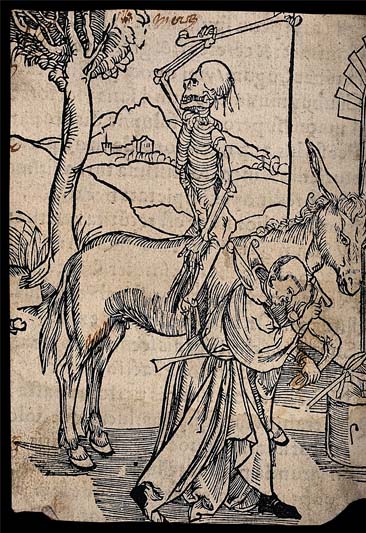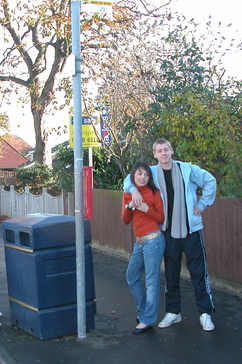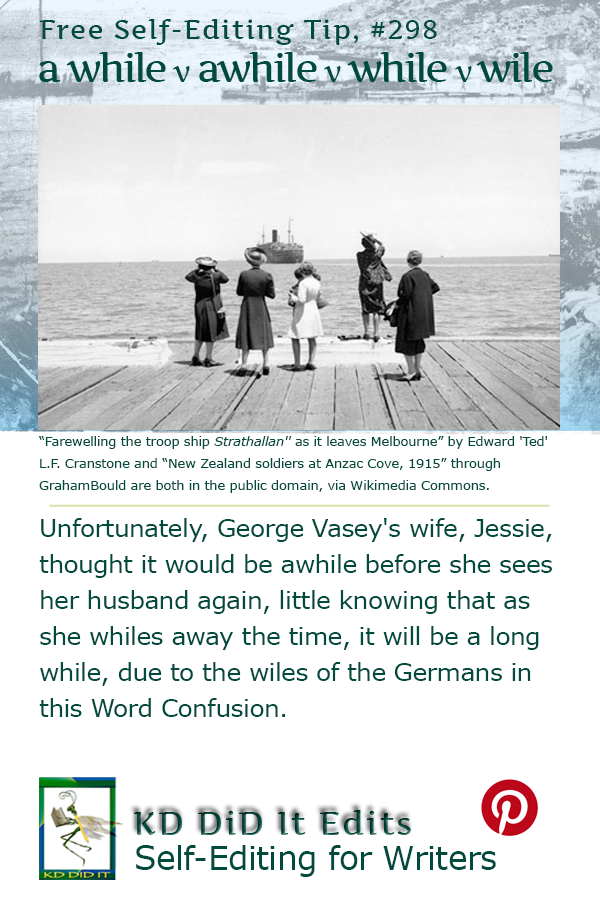Revised as of
25 June 2023
The first three words are definitely one of my bête noires, and I’ve reworked the definitions several times as they are tricky buggers.
The fourth word was added after I ran into an author confused about the difference between while and wile; I’ve added the latter into the post. It’s a wily sort of word, a connotation of underhandedness as it seeks to deceive and completely different from the while — and not just because it’s missing an h!
Getting back to while, which is itself a tricky bugger, while, on its own, is relatively simple with no question of whether the a is separate or attached since it doesn’t exist.
A Trick to Distinguish Between A While and Awhile
Since a while is defined as a long period of time, so is the distance between the two words.
And, since awhile is a short period of time, there isn’t any time for the a to get away!
It’s determining the a‘s position when it’s present that becomes so much more difficult. In general, you’re probably fairly safe in assuming that if you are using for, then the a is on its own.
You may also want to explore the Word Confusion post, “While versus Whilst.
| Examining differences between . . . | |
|---|---|
| A While | Awhile |
| You can test if you should use a while or awhile by replacing awhile with a different adverb. If it works, use awhile. If it doesn’t work, use a while, although this test is not infallible.
In general, you’re better off determining if the phrase or word is a noun or an adverb. |
|
| Can I keep it for a while?
OR Can I keep it for a while? “a while” is functioning as a noun phrase |
Can I keep it awhile?
Can I keep it eagerly? According to Snarky, it doesn’t work, and yet “awhile” does work as an adverb since it modifies “keep”. — as in “how long can I keep it?” Awhile. |
| I worked for a while before leaving for my date.
“a while” is functioning as a noun phrase |
I worked awhile before leaving for my date.
I worked slowly . . . “awhile” is working as an adverb modifying “worked” |
| C’mon, baby, we’ll just play for a while. | C’mon, baby, we’ll just play awhile.
. . . we’ll just play happily. “awhile” works as an adverb modifying how long “play” will last |
| George! Hi! Come sit down and stay for a while.
“a while” functions as a noun |
George! Hi! Come sit down and stay awhile.
. . . and stay silently? Okay, they are awkward adverbs *eye roll*, and yet, “awhile” does functions as an adverb modifying “stay” |
| We have a while left to wait.
“a while” functions as a noun |
We will have to wait awhile.
. . .wait weekly? “awhile” functions as an adverb modifying how long the “wait” will be |
| Guests waited for a while for food.
“a while” works as a noun here |
Guests waited awhile for food.
Guests waited impatiently for food. “awhile” is an adverb that modifies “waited” |
Word Confusions . . .
. . . started as my way of dealing with a professional frustration with properly spelled words that were out of context in manuscripts I was editing as well as books I was reviewing. This particular confusion between “authorities” is another reason why I started writing these posts about Word Confusions. I want a central “authority” I can head to when I have a question. And I don’t want to spend endless hours hunting through the online and print confusion trying to make sense of it!
If you found this post on “A While vs Awhile vs While vs Wile” interesting, consider subscribing to KD Did It, if you’d like to track this post for future updates — and I hope you’ll share with us words or examples that have helped you figure this one out.
| A While | Awhile | While | Wile |
|---|---|---|---|

Skeleton Sits Backward on a Horse Waiting for a Blacksmith is courtesy of Wellcome Trust under the CC BY 4.0 license, via Wikimedia Commons. — He’s obviously been waiting a while for the blacksmith to show up. |

Cosham by Martyn Pattison is under the CC BY-SA 2.0 license, via Wikimedia Commons. — Fortunately, it will only be awhile for these kids waiting for the bus. |

A Love Story, 1903, an oil on canvas by E. Phillips Fox, was contributed by Happy Waldo courtesy of The Art Gallery of Ballarat and is in the public domain, via Wikimedia Commons. — Reading can while away many hours. |

Acme Instant Tunnel Box by Kenneth uploaded from Flickr is under the CC BY 2.0 license, via Wikimedia Commons. — Wile E. Coyote hits MIT with a slam. |
| Part of Grammar: | |||
| Article + Noun = Noun phrase | Compound word
Adverb The for is built-in: |
Adverb, relative; Conjunction, subordinating; Noun 1; Verb, transitive 1 Alternate spelling for the adverb and conjunction: whiles |
Noun Verb, transitive Plural for the noun and third person present verb: wiles |
| Frequently used after prepositions
for a while once in a while Adverb: A period of time Time Noun: A length of time |
For a while (Remember, “awhile” MEANS “for a while”, it doesn’t mean it’s written as “for awhile”.) For a short time |
Adverb, relative: As (indicating a contrast) In spite of the fact that Although [British, variation] Whilst Conjunction, subordinating: Throughout the time that
Even though
At the same time that (showing an analogous or corresponding action) [British] Whilst Noun: [the while] At the same time, meanwhile Time and effort used in the performance of an action [Poetic, literary] During the time that Preposition: Verb: |
Noun: Devious or cunning stratagems employed in manipulating or persuading someone to do what one wants Verb, transitive: The phrase wile away the time is another way of saying while away the time |
| Examples: | |||
| Can I keep it a while?
We’ll be there in a while. I want to rest for a while before I go out tonight. Every once in a while I like to head out to the beach. After a while it all seems the same. It’s been a while since I last saw you, Mary. |
I worked awhile before leaving for my date.
Look, just stand here awhile. We paused awhile before we continued on. |
Adverb, relative: The period while the animal remains alive is critical. Conjunction, subordinating: One person wants out, while the other wants the relationship to continue. While I wouldn’t recommend a nighttime visit . . . While she appreciated the honor, she could not accept the position. The floor was strewn with books, while magazines covered the tables. A synonym more common to British usage, whilst is considered pretentious and/or old-fashioned in America. Please light the fire while I’m cooking. I prefer to stay inside while it’s raining. Noun: Hey, I’ll make it worth your while. [Poetic, literary] . . . beseeching, him, the while his hand she wrung . . . Preposition: Verb, transitive: Whiling away the hours, he read a book. |
Noun: He tried to work his wiles on her. Use your wiles to get the terms you want. Verb, transitive: Oh, well, it’s another way to wile away the time. I’ve got to find something to do to wile away the time! The end of that chapter wiled her from her work. |
| Derivatives: | |||
| Adjective: wily, wilier, wiliest Verb, transitive: outwile, outwiled, outwiling |
|||
| History of the Word: | |||
| Old English | Old English (before 12th century) āne hwīle meaning (for) a while. | Old English hwīl meaning period of time is of Germanic origin and related to the Dutch wijl and the German Weile. | Middle English and might be from an Old Norse word related to vél meaning craft. |
C’mon, get it out of your system, bitch, whine, moan . . . which words are your pet peeves? Also, please note that I try to be as accurate as I can, but mistakes happen or I miss something. Email me if you find errors, so I can fix them . . . and we’ll all benefit!
Satisfy your curiosity about other Word Confusions on its homepage or more generally explore the index of self-editing posts. You may also want to explore Book Layout & Formatting Ideas, Formatting Tips, Grammar Explanations, Linguistics, Publishing Tips, the Properly Punctuated, Writing Ideas and Resources, and Working Your Website.
Resources for A While vs Awhile vs While vs Wile
Apple Dictionary.com
Forgarty, Mignon. “‘A While’ Versus ‘Awhile’.” Grammar Girl. 15 Dec 2016. Web. n.d. <https://www.quickanddirtytips.com/articles/a-while-versus-awhile/>.
Snarky. “A While vs. Awhile: Learn the Difference.” The Snarky Grammar Guide. 13 Sept 2010. Web. n.d. <https://snarkygrammarguide.blogspot.com/search?q=a+while>.
Pinterest Photo Credits:
Farewelling the Troop Ship Strathallan as It Leaves Melbourne“, 15 December 1939, by Edward ‘Ted’ L.F. Cranstone finds “women friends and family on the wharf waving farewell to the departing troop transport ship RMS Strathallan carrying the advance party of the 6th Division AIF to service overseas. They include: George Vasey’s wife, Jessie (second from the left), her sisters Thelma Halbert (left) and Doris Sleigh (second from right), and Vasey’s sister Marjorie (right). The photograph is especially poignant because Vasey did not return from the war.
This image is available from the Collection Database of the Australian War Memorial under the ID Number: 000304/01 and is of Australian origin and is now in the public domain because its term of copyright has expired. According to the Australian Copyright Council (ACC), ACC Information Sheet G023v17 (Duration of copyright) (August 2014).
The background is “New Zealand Soldiers at Anzac Cove, 1915” and is one of a set of 14 photographs given to [GrahamBould] by [his] “grandmother. My grandfather, who was wounded at Gallipoli, obtained these from another New Zealand soldier who was subsequently killed.”
This work is in the public domain in New Zealand and other countries and areas where the copyright term is the author’s life plus 70 years or less. This file has been identified as being free of known restrictions under copyright law, including all related and neighboring rights.


